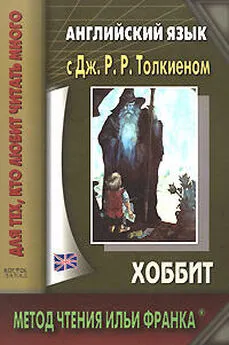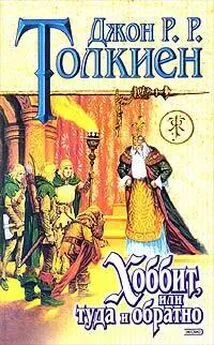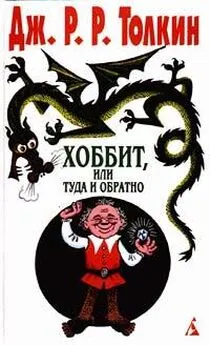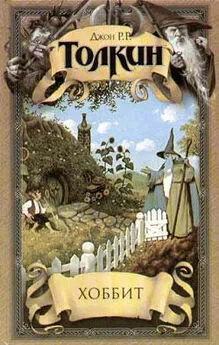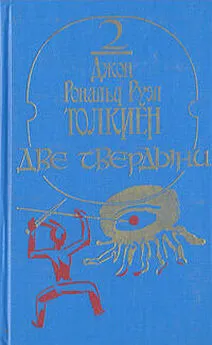Джон Толкиен - Английский язык с Дж. Р. Р. Толкиеном. Хоббит
- Название:Английский язык с Дж. Р. Р. Толкиеном. Хоббит
- Автор:
- Жанр:
- Издательство:АСТ, Восток-Запад
- Год:2008
- Город:Москва
- ISBN:978-5-17-048593-2, 978-5-478-00597-9
- Рейтинг:
- Избранное:Добавить в избранное
-
Отзывы:
-
Ваша оценка:
Джон Толкиен - Английский язык с Дж. Р. Р. Толкиеном. Хоббит краткое содержание
В книге предлагается произведение на английском языке Джона Р. Р. Толкиена «Хоббит», адаптированное (без упрощения текста оригинала) по методу Ильи Франка. Уникальность метода заключается в том, что запоминание слов и выражений происходит за счет их повторяемости, без заучивания и необходимости использовать словарь.
Пособие способствует эффективному освоению языка, может служить дополнением к учебной программе.
Предназначено для студентов, для изучающих английский язык самостоятельно, а также для всех интересующихся английской культурой.
Пособие подготовила Ольга Ламонова.
Английский язык с Дж. Р. Р. Толкиеном. Хоббит - читать онлайн бесплатно полную версию (весь текст целиком)
Интервал:
Закладка:
Of course “somebody” meant Bilbo (конечно, «кто-то» означало /что это должен быть/ Бильбо). They chose him (они выбрали его; to choose (chose, chosen) — отбирать, избирать ) because to be of any use (потому что для того, чтобы быть хоть как-то полезным; use — употребление, назначение, толк, выгода ) the climber must get his head above the topmost leaves (тот, кто будет карабкаться, должен будет поднять свою голову над самыми высокими листьями; to climb — карабкаться, взбираться ), and so he must be light enough (и поэтому он должен быть достаточно легким) for the highest and slenderest branches to bear him (чтобы самые высокие и тонкие ветви могли его вынести). Poor Mr. Baggins had never had much practice in climbing trees (у бедного мистера Бэггинса никогда не было большого опыта в лазанье по деревьям), but they hoisted him up (но они подсадили его; to hoist — поднимать, подсаживать, втаскивать ) into the lowest branches of an enormous oak (на самые нижние ветви огромнейшего дуба) that grew right out into the path (росшего прямо рядом с тропой), and up he had to go (и он должен был вскарабкаться вверх) as best he could (изо всех сил, как только мог). He pushed his way through the tangled twigs (он прокладывал свой путь сквозь спутанные прутики; to tangle — запутывать (ся) ) with many a slap in the eye (с множеством шлепков по глазам); he was greened and grimed (он вымазался в зелени и испачкался; grime — глубоко въевшаяся грязь, сажа; to grime — грязнить, загрязнять, марать, пачкать ) from the old bark of the greater boughs (о старую кору больших ветвей); more than once he slipped (не раз: «больше, чем однажды» он поскальзывался) and caught himself just in time (и удерживался /от падения/: «подхватывал себя» как раз вовремя); and at last (и наконец), after a dreadful struggle in a difficult place (после ужасного напряжения в трудном месте; struggle — борьба; усилие ) where there seemed to be no convenient branches at all (где, как казалось, вовсе не было подходящих ветвей), he got near the top (он подобрался к вершине). All the time he was wondering (все это время он задавался вопросом) whether there were spiders in the tree (были ли на этом дереве пауки), and how he was going to get down again (и как же он сможет снова спуститься) (except by falling (за исключением /способом/ падения)).
somebody [ˈsʌmbǝdɪ] climber [ˈklaɪmǝ] enormous [ɪˈnɔ: mǝs]
Of course “somebody” meant Bilbo. They chose him because to be of any use the climber must get his head above the topmost leaves, and so he must be light enough for the highest and slenderest branches to bear him. Poor Mr. Baggins had never had much practice in climbing trees, but they hoisted him up into the lowest branches of an enormous oak that grew right out into the path, and up he had to go as best he could. He pushed his way through the tangled twigs with many a slap in the eye; he was greened and grimed from the old bark of the greater boughs; more than once he slipped and caught himself just in time; and at last, after a dreadful struggle in a difficult place where there seemed to be no convenient branches at all, he got near the top. All the time he was wondering whether there were spiders in the tree, and how he was going to get down again (except by falling).
In the end (в конце концов) he poked his head (он просунул свою голову; to poke — совать, пихать, тыкать, толкать ) above the roof of leaves (над крышей из листьев), and then he found spiders all right (и тогда-то он и обнаружил пауков). But they were only small ones (но они были всего лишь маленькими пауками) of ordinary size (обычных размеров), and they were after the butterflies (и они охотились за бабочками; to be after smb. — преследовать, пытаться поймать кого-либо ). Bilbo’s eyes were nearly blinded by the light (глаза Бильбо почти что ослепли от света). He could hear the dwarves (он мог слышать гномов) shouting up at him from far below (кричавших ему откуда-то снизу), but he could not answer (но он не мог ответить), only hold on and blink (/смог/ только вцепиться /в ветви/ и щуриться; to blink — мигать; щуриться ). The sun was shining brilliantly (солнце ослепительно сияло), and it was a long while (и прошло немало времени) before he could bear it (пока он смог выносить его). When he could (когда он смог), he saw all round him a sea of dark green (он увидел со всех сторон вокруг себя темно-зеленое море), ruffled here and there by the breeze (покрытое там и здесь рябью от легкого ветерка); and there were everywhere hundreds of butterflies (повсюду были сотни бабочек). I expect they were a kind of ‘purple emperor’ (я думаю, что они были вида "переливница ивовая"; purple — пурпурный; emperor — император ) a butterfly that loves the tops of oak-woods (бабочка, которая любит верхушки дубовых деревьев), but these were not purple at all (но эти были совершенно не пурпурными), they were a dark dark velvety black (они были темные-темные бархатисто-черные) without any markings to be seen (без какой-либо расцветки, которую можно было бы разглядеть; marking — клеймение, маркировка, разметка, окраска ). He looked at the ‘black emperors’ for a long time (он смотрел на этих "черных императоров" достаточно долгое время), and enjoyed the feel of the breeze (и наслаждался ощущением легкого ветерка) in his hair and on his face (на своих волосах и на лице); but at length the cries of the dwarves (но наконец крики гномов), who were now simply stamping with impatience down below (которые сейчас просто топали ногами от нетерпения далеко внизу), reminded him of his real business (напомнили ему о его настоящем деле; real — действительный, истинный, подлинный ). It was no good (все было бесполезно). Gaze as much as he might (пристально вглядываясь, насколько он только мог), he could see no end to the trees and the leaves (он не мог увидеть окончания деревьям и листьям) in any direction (во всех направлениях). His heart (его душа), that had been lightened by the sight of the sun (которая обрадовалась от вида солнца; to lighten — облегчать, становится веселее; light — легкий ) and the feel of the wind (и ощущения ветерка), sank back into his toes (ушла: «упала» снова в пятки; to sink (sank, sunk) — погружаться, опускаться ): there was no food to go back to down below (не было /у них/ еды, чтобы вернуться назад /вниз/).
spider [ˈspaɪdǝ] butterfly [ˈbʌtǝflaɪ] purple [ˈpǝ: p (ǝ) l] emperor [ˈemp (ǝ) rǝ]
In the end he poked his head above the roof of leaves, and then he found spiders all right. But they were only small ones of ordinary size, and they were after the butterflies. Bilbo’s eyes were nearly blinded by the light. He could hear the dwarves shouting up at him from far below, but he could not answer, only hold on and blink. The sun was shining brilliantly, and it was a long while before he could bear it. When he could, he saw all round him a sea of dark green, ruffled here and there by the breeze; and there were everywhere hundreds of butterflies. I expect they were a kind of ‘purple emperor, ’ a butterfly that loves the tops of oak-woods, but these were not purple at all, they were a dark dark velvety black without any markings to be seen. He looked at the ‘black emperors’ for a long time, and enjoyed the feel of the breeze in his hair and on his face; but at length the cries of the dwarves, who were now simply stamping with impatience down below, reminded him of his real business. It was no good. Gaze as much as he might, he could see no end to the trees and the leaves in any direction. His heart, that had been lightened by the sight of the sun and the feel of the wind, sank back into his toes: there was no food to go back to down below.
Actually, as I have told you (на самом деле, как я уже сказал вам), they were not far off the edge of the forest (они находились невдалеке от края леса); and if Bilbo had had the sense to see it (и если бы у Бильбо хватило бы ума понять то), the tree that he had climbed (что дерево, на которое он взобрался), though it was tall in itself (хотя оно само по себе было высоким), was standing near the bottom of a wide valley (стояло в самом низу широкой долины; near — близко, недалеко, bottom — низ, нижняя часть; дно ), so that from its top (так что с его вершины) the trees seemed to swell up all round (все деревья вокруг, казалось, поднимались вверх; to swell (swelled, swollen) — надуваться, опухать; возвышаться ) like the edges of a great bowl (подобно краям гигантской чаши), and he could not expect to see (и он не мог рассчитывать на то, чтобы увидеть) how far the forest lasted (насколько далеко тянулся лес; tolast — продолжаться, длиться ). Still he did not see this (и все же он не увидел = не понял этого), and he climbed down full of despair (и он спустился вниз, полный отчаяния). He got to the bottom again at last (он спустился вниз снова, в конце концов) scratched (поцарапанный), hot (разгоряченный), and miserable (и несчастный), and he could not see anything (и он не мог ничего видеть) in the gloom below (внизу, во мраке) when he got there (когда он туда добрался). His report soon made the others (его сообщение вскоре сделало всех остальных) as miserable as he was (такими же несчастными, как и он сам).
Читать дальшеИнтервал:
Закладка:
